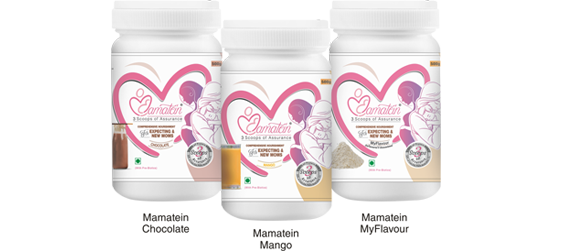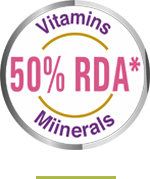


Pregnancy represents a unique stage in life and maternal nutrition plays a major role in maternal and child health. Good maternal nutritional status, along with maternal body composition, metabolism and placental nutrient supply, are the main factors that can positively influence foetal development & have been associated with positive pregnancy outcomes.
After birth, colostrum and breast milk ideally should be the early sources of nutrients for the baby. The nutrients present in this milk are derived from the mother’s diet or from her nutrient reserves. If the diet consumed during lactation fails to adequately replenish her nutrient reserves, her own stores of these nutrients may get depleted, adversely impacting her health. Therefore, maintaining a good nutritional status post-delivery, is important for the mother’s recovery as well as for healthy lactation.

of Urban population is unaware of their daily protein requirement.1
of Urban population is protein deficient.1
of Urban women are anaemic.2
of Urban pregnant women have Hypo-calcemia.3
of Urban pregnant women are folic acid deficient.4
The recommended increase in daily nutrient intake during pregnancy ranges from
• 40-50% for protein
• 25-50% for most micro nutrients
• Upto 100% for calcium
Increased energy requirements during pregnancy & breast-feeding warrant
• Regular meals of larger portions
• A higher frequency of food intake.5
Ensuring this enhanced level of intake and maintaining it consistently, throughout the period of maternity, can be a challenge. Especially considering a largely vegetarian Indian diet.
to learn more about Motherhood & Nutrition

Theoretically, it may seem possible to fulfil this additional nutritional requirement even with one’s regular diet, but it would require a disciplined and highly regimented diet plan, without leaving much room for individual preferences and indulgences.
Pregnancy is a time for joy and it is important that you cherish this experience without feeling like a patient – calculating grams of protein or popping multiple pills.
As an Expecting or New Mom, adding a clinically validated supplement to your diet, will allow you to build some flexibility into your diet, making room for occasional cravings and indulgences, while giving you the peace of mind that all your nutritional requirements are being met.
Presenting


Mamatein is a clinically validated comprehensive nutritional supplement, that caters to the maternal nutritional need, during and after pregnancy.
Mamatein has been formulated scientifically, keeping in mind the recommended clinical guidelines, food habits of Indian women during and after pregnancy, the relatively high percentage of vegetarian content in home food (even among non-vegetarians), and the contemporary lifestyle. Mamatein focuses on bridging the gap between daily nutritional intake from diet and the Recommended Dietary Allowance (RDA), as defined by the ICMR-2010 guidelines, during pregnancy and lactation.
![]()
Conforming to the clinical guidelines, Mamatein is loaded with the right amount of all the key nutrients, like Protein, Big 4 (DHA, Iron, Folic Acid, Calcium), Zinc and Vitamins.
Just 3 scoops of Mamatein every day, provides over ½ of Protein RDA6 and 50% RDA6 of the Big 4 (DHA, Iron, Folic Acid, Calcium), Zinc and Vitamins. This, alongside a healthy diet, is sufficient to take care of 100% of the required RDA for all the essential micro and macro nutrients, required for a healthy maternity.

Max Potency:
Packed with key nutrients
~ 65% Protein (~13g in 20g scoop). Hence the recommended serving of 3 scoops/day (60g) provides ½ of Recommended Daily Allowance (RDA*) of protein.

50% Of RDA
Of Big 4 (DHA, Iron, Folic Acid, Calcium), Key Minerals & Essential Vitamins In 3 Scoops (~60 g per day).

Avoids Unnecessary
Calories
Nil Added Sugar, Nil Maltodextrin, 8% Fibre (FOS – Pre-Biotic).

Versatile:
Your Choice Your Control
2 delicious flavours of Chocolate & Mango. My Flavour (unflavoured, unsweetened)-add to food, or make your own flavour.
to know how Mamatein is better than conventional supplements
*Assuming no existing deficiencies. Please follow your doctor’s advice regarding
supplementation. To be consumed along with a balanced diet.
References
© 2020 CHPL I All right reserved
© 2020 CHPL I All right reserved